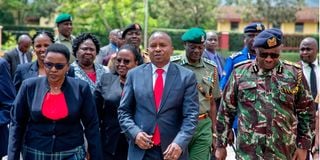Why Kithure Kindiki sided with Ipoa over prosecution of rogue officers

Interior CS Kithure Kindiki (centre) accompanied by PS Salome Beacco (left), IG Japheth Koome (right), Ipoa Chair Ann Makori among other officials during the memorial service for National Police and Kenya Prisons Services fallen officers at NPC Embakasi Campus.
What you need to know:
- Ipoa, DPP and police bosses at cross-roads on prosecution of rogue officers.
- Kindiki says Ipoa should be left to exercise its mandate as defined in the Constitution.
Interior Cabinet Secretary (CS) Kithure Kindiki has sided with the Independent Policing and Oversight Authority (Ipoa) in its tussle with police bosses and the Office of the Director of Public Prosecutions (ODPP) over the prosecution of rogue police officers.
Ipoa’s role, Prof Kindiki said, is expressly defined in the Constitution and should be left to exercise its mandate.
This came even as a cross-section of officers sent anonymous memorandum to the National Police Service Commission (NPSC) demanding that there be established a police tribunal structured like a court martial to be trying suspected errant police officers.
They complained that continued arrest, holding and prosecution among civilians was compromising their safety and access to unadulterated justice.
But Prof Kindiki appeared to pour cold water on that narrative.
“Those who act expressly outside the rule of law should not even wait for Ipoa…they should be arrested, arraigned and jailed….if possible jailed never to come back, we have no use for such officers,” he said on Thursday during the commemoration of officers felled in line of duty at the National Police Service College, Embakasi ‘A’ Campus on Thursday.
He added: “We support Ipoa’s oversight role especially against trigger-happy police officers and others….who are adulterating, damaging and diluting the splendid and sacrificial work being done by majority of our officers…We have diligent officers especially those who are working in the frontline.”
Under the procedures of operation, Ipoa constitutionally enjoys power to recommend prosecution and/or disciplinary action for an officer who is found to have violated the law or acted in a manner that brings disrepute to the National Police Service (NPS) and may also recommend a change in processes or procedures of the NPS.
Prof Kindiki said there should be no contradiction about the functions bestowed upon all linkages of justice, more so on Ipoa “whose mandate of trying to shed a spotlight on rogue elements within the police service is well defined”.
He says what should be strengthened is the complimentarity and mutual support of each of the roles of the different institutions in pursuit of a more professional and safer law enforcement duties.
The CS reiterated that all officers regardless of their rank, should be punished by the law the moment they are convicted of abusing their privileges and firearms.
The CS lamented that there are ridiculous cases that cannot be defended “like those of officers walking into bars armed, patronise but refuse to pay bills and once prodded to pay up they start killing people around them.”
This came in the midst of a storm that has emanated from a letter by the DPP regarding charging of police officers suspected of crime.
In the November 4, 2023 letter to all of regional coordinators and county heads, the DPP advised that all approvals of charging police officers should be sought exclusively from the ODPP headquarters.
In the earlier arrangement, Ipoa would investigate officers accused of committing crime and recommend charging through respective county ODPP.
“Kindly be advised that all suspected criminal cases involving police officers should be referred to Ipoa, so as to take independent and comprehensive investigations pursuant to its (Ipoa) statutory mandate,” reads the memo by Deputy Director of Public Prosecutions Victor Mule.
He advised that “upon completion of probe, the resultant inquiry files should be forwarded to the ODPP headquarters for purposes of making the decision whether or not to prosecute”.
On Thursday, Inspector General of Police Japhet Koome lamented that alcoholism, extravagance and peer pressure has taken toll on police discipline: “It is not again that we are a service that loves killing…sometimes it is not about being trigger happy but serious mind games of who between the officers and the thugs will draw first.”





